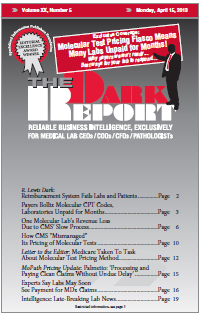CEO SUMMARY: How is it that some commercial payers for one lab running molecular tests have continued to pay the lab for tests it has run this year, but contractors for CMS have so far failed to pay? That’s the question one lab CEO is asking. Both the commercial payers and the CMS contractors are …
One Lab’s Revenue Loss Due to CMS’ Slow Process Read More »
To access this post, you must purchase The Dark Report.


